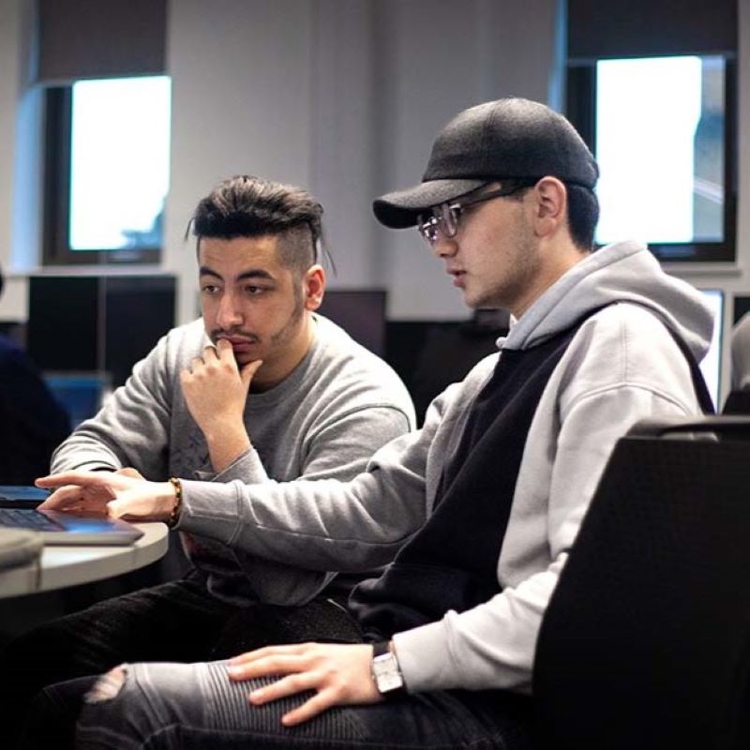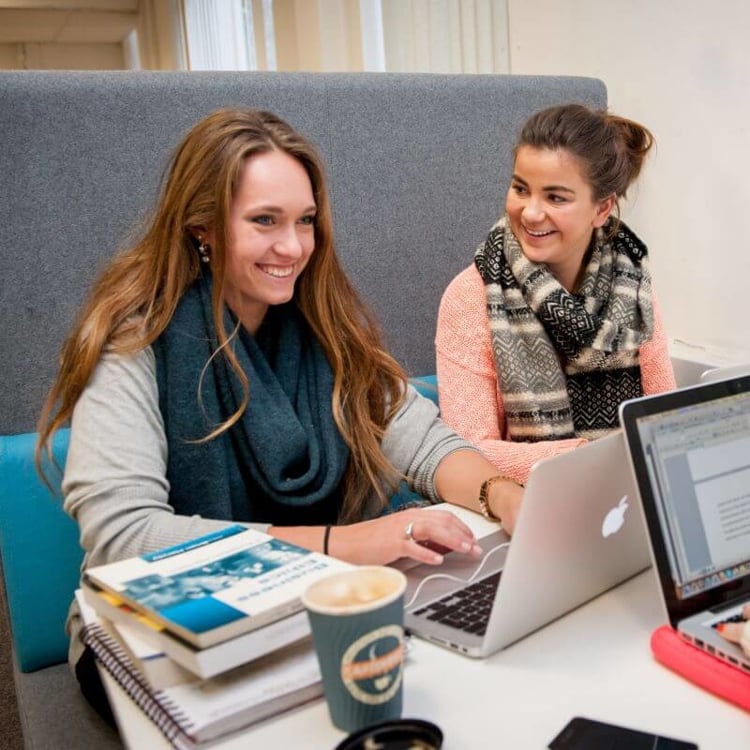/ Foundation /
Start date:
September 2025
Entry tariff:
48–64 UCAS points (or equivalent)
UCAS code:
G4FS

Our Computing Foundation Studies: Certificate of Higher Education is a one year course that will give you the skills and confidence you need to succeed in a career in computing, or prepare you for a full degree in the field.
Did you know
You'll learn in an exciting environment that champions individuality, encourages collaboration and supports you every step of the way.
Once you complete your CertHE, you can progress onto studying a degree.
Top 3 modern university in London
(Complete University Guide 2025)

Ranked in the top 15% in the world
Times Higher Education Young University Rankings 2024

#8 in England for undergraduate student satisfaction
National Student Survey 2024

Modules
30 credits
You will develop your core academic and integrated English language skills of speaking, listening, reading and writing. You will become familiar with key academic skills and concepts, such as referencing methods and awareness of academic integrity and tone. You will apply these skills and knowledge to both broad topics and also your chosen subject pathway.
Teaching and learning
You will be required to actively engage in on-campus learning for up to 10 hours a week.
You will be taught through a full range of teaching and learning methods, which include lectures, seminars, workshops, discussion groups, group directed tasks and presentations. This will enable you to learn from your peers and tutors in both structured and information settings.
You will be encouraged to think creatively about your approach to learning and discussions with your peers. You will also have access to recordings, resources, links and signposting through Moodle to enrich your learning.
Assessment
You will be assessed through group and individual presentations, comparative and reflective essays, multiple choice exams, coursework and reports, oral exams, portfolios, case studies and blogs.
30 credits
You will develop your research, numeracy and information technology skills. You will investigate the difference between primary and secondary research, conduct your own research project and demonstrate your findings through data analysis. You will also develop your awareness of equality, diversion and inclusion in the UK, through a real-world issue; discrimination in the workplace.
Teaching and learning
You will be required to actively engage in on-campus learning for up to 10 hours a week.
You will be taught through a full range of teaching and learning methods, which include lectures, seminars, workshops, discussion groups, group directed tasks and presentations. This will enable you to learn from your peers and tutors in both structured and information settings.
You will be encouraged to think creatively about your approach to learning and discussions with your peers. You will also have access to recordings, resources, links and signposting through Moodle to enrich your learning.
Assessment
You will be assessed through group and individual presentations, comparative and reflective essays, multiple choice exams, coursework and reports, oral exams, portfolios, case studies and blogs.
30 credits
You will be taught about how the use of computing software impacts the environment from day-to-day activity through use of business and everyday jobs. This is through the excessive use of computing software as well as the changing way that society operates. You will be encouraged to engage in debates and discussions regarding energy consumption in the use of computing software, in terms of the amount of use as well as the type of materials utilised. You will be encouraged to look at responsible innovation and software impact and the long-term effects this may have.
You will look at how the increased use of IT and computing has contributed to the significant development of globalisation in the interconnectivity and internationalisation of the job market. Discussions on how globalisation has contributed to the international development of education, technology development and the emerging market economies through operating systems and internet operations. This is also linked to their assignment in the international platform of Linked In in developing their e-portfolio.
Teaching and learning
The teaching delivery for each module consists of one, one-three-hour lecture and one, two-hour lab session each week with pair and group work.
There will also be a 30-minute weekly virtual task and multiple-choice quizzes.
Assessment
This module will be assessed using a multiple-choice test and online portfolio.
40% - multiple choice test, which will take place online during a class.
60% - online portfolio, in this written task you will create a blog post, which reports on an individual data research and processing project. You will also create a LinkedIn profile and subject weekly learning journal entries.
30 credits
This module focuses on how to solve problems via program development. The module initially builds your understanding of logic, before teaching you how to develop algorithms. The latter half of the module focuses on programming using a Visual Programming Language (VPL) such as Android App Inventor or Google’s Blockly. The module ends with a discussion on the limits of computation, including data representation and physical limitations.
You will be taught about how the use of computing software impacts the environment from day-to-day activity through use of business and everyday jobs. This is through the excessive use of computing software as well as the changing way that society operates. You will be encouraged to engage in debates and discussions regarding energy consumption in the use of computing software, in terms of amount of use as well as type of materials utilised. You will look at responsible innovation and software impact and the long-term effects this may have.
The module explores how advancements in computing and IT have accelerated globalisation by enhancing interconnectivity, transforming industries, and expanding access to information. You will examine the role of computational thinking and problem-solving in a global context, including the impact of software development, and automation on international markets. Discussions will focus on how programming and algorithm design contribute to technological advancements, remote collaboration, and the evolving global job market. Additionally, you will be able to engage with international computing standards and digital platforms, such as LinkedIn, to develop your profile and understand the significance of global networking in the technology sector.
Teaching and learning
The teaching delivery for each module consists of one, one-three-hour lecture and one, two-hour lab session each week with pair and group work.
There will also be a 30-minute weekly virtual task and multiple-choice quizzes.
Assessment
This module will be assessed using programming coursework and a class test.
60% - coursework, you will design a simple algorithm to solve a problem using flowcharts and pseudocode.
40% - class test, you will construct a program to solve using a Visual Programming Language.
These modules are those we currently offer and may be subject to change.

Skills
Gain the computing skills that matter most to employers.
You'll gain a basic understanding of using English for academic purposes and a thorough grounding in academic study skills, such as essay structure, exam technique, referencing, journal and library research.
You'll be introduced to the key skills and areas of digital literacy and how to solve problems via program development.
Learning
You’ll be taught via lectures, seminars and workshops by our passionate and committed academic staff.
You’ll have regular contact with your academic guidance tutor to help you develop as well as face-to-face and online careers and study support.
As our courses are taught over no more than three days per week, you’ll have the flexibility to take on paid part-time work, placements, or internships – helping you gaining real-world experience.


Assessment
Benefit from assessments that prepare you for life beyond university.
You’ll experience a wide range of assessments that enhance your understanding, explore ideas in-depth and express your creativity.
These include:
- Online tests
- Presentations
- Essays
Your academic tutors will be on hand to support you throughout your studies to guide you to achieve your best.
Career
We will prepare you for your career from day one.
Our Computing Foundation Studies: Certificate of Higher Education will give you the computing-specific skills and confidence you need for a profession in computing or to prepare you for studying your undergraduate degree with us.
Our careers support team is available to support you from the start of your studies. They will help you build your CV, prepare for interviews, and meet and learn from successful graduates working at the top of their careers.

Open days
Get a real taste of our campus, community and what it’s like to study at Roehampton
Applying
Full-time UK undergraduate students apply through UCAS.
Entry tariff
48–64 UCAS points (or equivalent)
Looking to work out your UCAS points or find out about our entry requirements? Find out more.
When we consider applications to study with us, we form a complete view of your achievements to date, and future potential, and can offer flexibility in entry requirements. Find out more about our Contextual Offer scheme.
General entry requirements
September 2025 entry tuition fees (UK)
Foundation Studies: Certificate of Higher Education: £9,535



